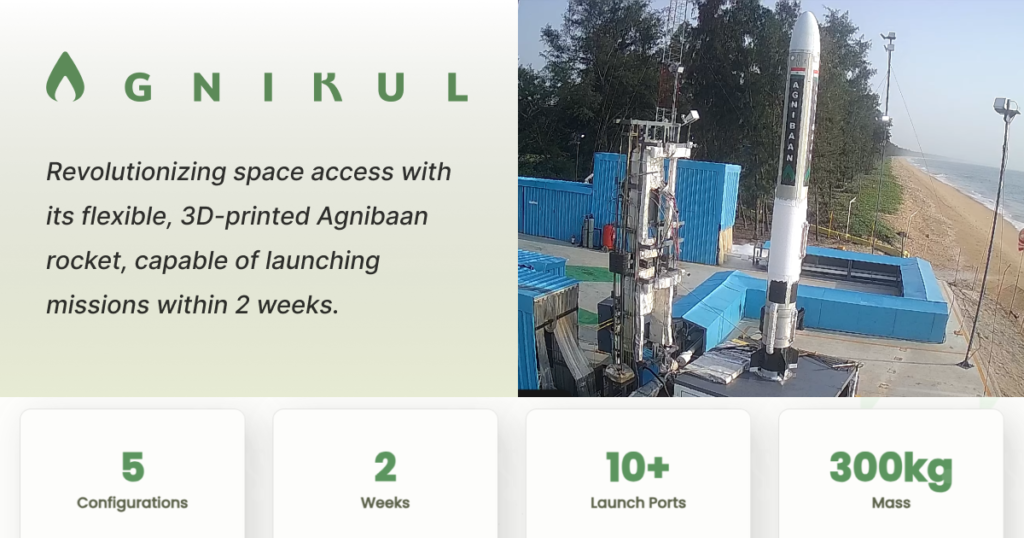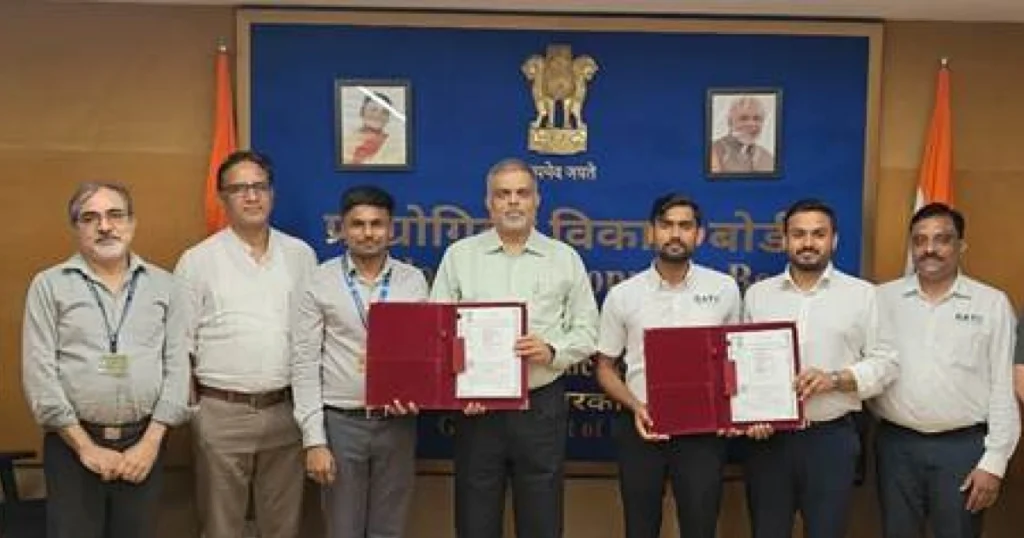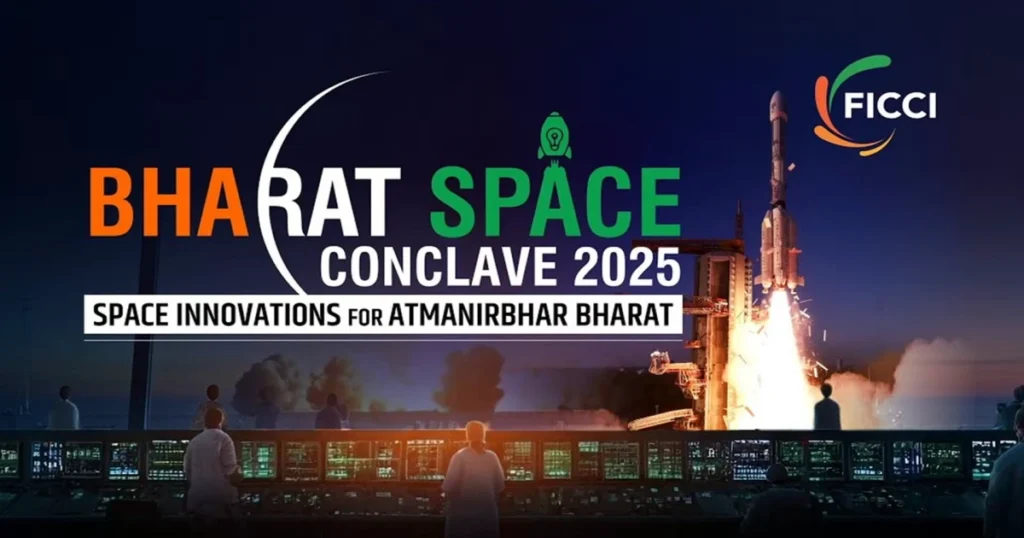Space exploration has long been perceived as the domain of governments and large corporations, with high costs and complex technology making it inaccessible to smaller players.
Agnikul Cosmos, an ambitious Indian startup founded in 2017, is breaking down these barriers, aiming to make space more accessible, affordable, and efficient for everyone.
By developing innovative, customizable rockets like Agnibaan, Agnikul is solving the challenge of simplifying the Earth-to-space journey.
Based out of Chennai, Tamil Nadu, Agnikul is already making waves in the space industry with its technological innovations and its bold vision.
Solving the Space Access Challenge
The key problem Agnikul is addressing is the difficulty, time, and cost associated with launching payloads into space.
For decades, the cost of launching even small satellites has been prohibitive for many, often requiring shared missions and complex scheduling that limits access.
Agnikul is tackling this challenge by designing a product that makes the Earth-to-space journey simpler, quicker, and more affordable.
At the heart of this mission is their flagship rocket, Agnibaan, a highly customizable, two-stage launch vehicle capable of carrying up to 300 kg to orbits as high as 700 km.
What sets Agnibaan apart is its configurability; the rocket’s first stage can fly with 4 to 7 engines, depending on the mission’s needs.
This flexibility enables Agnikul to tailor each launch to the payload, the orbit, and the launch site, maximizing efficiency and reducing costs.
Another innovative feature is Agnibaan’s mobility.
Designed for use across more than 10 launchports worldwide, the rocket can be deployed from multiple locations, expanding its accessibility and utility.
This flexibility is further supported by Dhanush, the custom-built mobile launch pedestal that allows for consistent and reliable launches from any chosen location.
Engineering Marvels: 3D Printing and Innovation
One of Agnikul’s most groundbreaking technological advancements is their extensive use of 3D printing in manufacturing.
Their Agnilet engine, entirely 3D printed in one piece, is a unique semi-cryogenic engine that eliminates the need for thousands of components usually required in rocket engines.
This innovation not only reduces manufacturing complexity but also allows for rapid, cost-effective production.
Agnikul’s facility in Chennai, Agnikul Rocket Factory – 1, is capable of producing two rocket engines per week, supporting their goal of manufacturing one launch vehicle per month.
Their engineering expertise extends beyond engines.
Agnikul has developed pressure vessels with thin-walled tanks wrapped in fiber, capable of holding high-pressure propellants and pressurants.
This design allows for the efficient storage of liquid propellants, further enhancing the rocket’s performance.
The Journey: From Inception to India’s First Private Launchpad
Agnikul’s journey began in 2016 as an idea on paper.
By 2017, the company was formally incorporated in Chennai, quickly moving into the National Center for Combustion Research & Development (NCCRD) at IIT Madras, which played a key role in their early research and development.
From 2018 onwards, Agnikul made significant strides.
They successfully fired their first set of thrusters and igniters, then realized their single-piece, fully 3D-printed upper-stage engine.
By 2019, the company started gaining commercial traction, signing agreements with potential customers and securing its seed round of funding.
A critical turning point came in 2020 when Agnikul signed a Non-Disclosure Agreement with the Indian Space Research Organization (ISRO), marking their entry into India’s mainstream space ecosystem.
Over the next two years, the company inaugurated India’s first private Launchpad and Mission Control Room at Sriharikota and signed a Memorandum of Understanding (MoU) with IN-SPACe, aligning with the Indian government’s new policy to promote private players in the space sector.
Agnikul’s steady progress and growing credibility attracted investments from several institutional investors, helping the startup raise over $11 million by 2021.
Their unique approach, including their highly configurable launch vehicle, has positioned them as pioneers in India’s budding private space industry.
Visionaries Behind the Startup
Agnikul Cosmos was co-founded by Srinath Ravichandran and Moin SPM, who both bring diverse expertise and a shared passion for space.
Srinath Ravichandran , a former Wall Street trader turned aerospace engineer, believes in using his multidisciplinary skills to solve large-scale problems, like making space accessible.
He holds degrees in Electrical Engineering, Financial Engineering from Columbia University, and Aerospace Engineering from the University of Illinois.
Moin SPM, an Operations Specialist with a background in Aeronautics and Business Administration, also brings experience in manufacturing and supply chain operations.
His interest in space law and the safety frameworks surrounding space exploration inspired him to co-found Agnikul with Srinath, driven by the vision of democratizing access to space.
Looking Ahead
Agnikul Cosmos is not just creating rockets; they are building an ecosystem that makes space launch services more available and efficient.
With their state-of-the-art technology, including Agnibaan’s baby stage for small satellite launches and SOrTeD (SubOrbital Technological Demonstrator) for testing key technologies, the company is poised to offer a range of services to commercial and government customers alike.
As they continue their journey, Agnikul aims to become a leader in the global small satellite launch market.
With a team of over 250 passionate individuals, including 37 ex-ISRO scientists, Agnikul’s focus remains on balancing innovation with reliability, ensuring that their products are both cutting-edge and safe.
Conclusion
Agnikul Cosmos’ vision of bringing space within everyone’s reach is rapidly becoming a reality.
By combining breakthrough engineering, scalable production, and strategic partnerships with ISRO, they are rewriting the rules of space exploration in India.
With their commitment to making the Earth-to-space journey as easy and affordable as possible, Agnikul Cosmos is well on its way to becoming a key player in the global space industry.



















